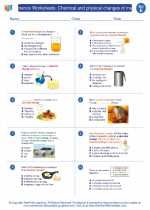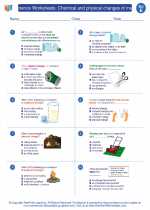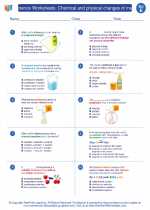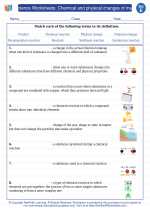Science Worksheets: Chemical and physical changes of matter -> urbanization
Urbanization
Urbanization is the process by which an increasing proportion of a country's population comes to live in towns and cities. It is a result of rural to urban migration as well as natural increase in urban populations.
Causes of Urbanization
- Rural to urban migration: People move from rural areas to urban areas in search of better job opportunities, education, healthcare, and improved quality of life.
- Industrialization: The growth of industries and factories in urban areas attracts people in search of employment.
- Natural increase: Urban areas often experience higher birth rates than rural areas, leading to population growth.
- Infrastructure development: Improved infrastructure in urban areas, such as transportation and communication networks, makes urban living more attractive.
Impact of Urbanization
Urbanization has both positive and negative impacts on society and the environment.
Positive Impacts
- Economic growth: Urban areas are hubs of economic activity, leading to increased job opportunities and higher income levels.
- Improved infrastructure: Urbanization leads to the development of better infrastructure including roads, public transportation, and utilities.
- Access to amenities: Urban dwellers have better access to healthcare, education, entertainment, and other amenities.
Negative Impacts
- Overcrowding: Urban areas can become overcrowded, leading to housing shortages and increased competition for resources.
- Environmental degradation: Urbanization can lead to pollution, deforestation, and loss of natural habitats.
- Social issues: Urban areas may face social problems such as crime, poverty, and inequality.
Managing Urbanization
Efforts to manage urbanization include urban planning, sustainable development, and the promotion of rural development to reduce migration to urban areas.
Study Guide
- Define urbanization and explain its causes.
- Discuss the positive and negative impacts of urbanization on society and the environment.
- Describe the challenges associated with managing urbanization.
- Compare and contrast rural and urban living in terms of amenities, infrastructure, and social issues.
- Research a specific urban development project and analyze its impact on the local community and environment.
Understanding urbanization is important for addressing the challenges and opportunities associated with the growing urban population. It requires a holistic approach that considers social, economic, and environmental factors.
[Urbanization] Related Worksheets and Study Guides:
.◂Science Worksheets and Study Guides Fifth Grade. Science Worksheets: Chemical and physical changes of matter

 Worksheet/Answer key
Worksheet/Answer key
 Worksheet/Answer key
Worksheet/Answer key
 Worksheet/Answer key
Worksheet/Answer key
 Vocabulary/Answer key
Vocabulary/Answer key
